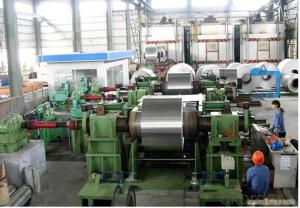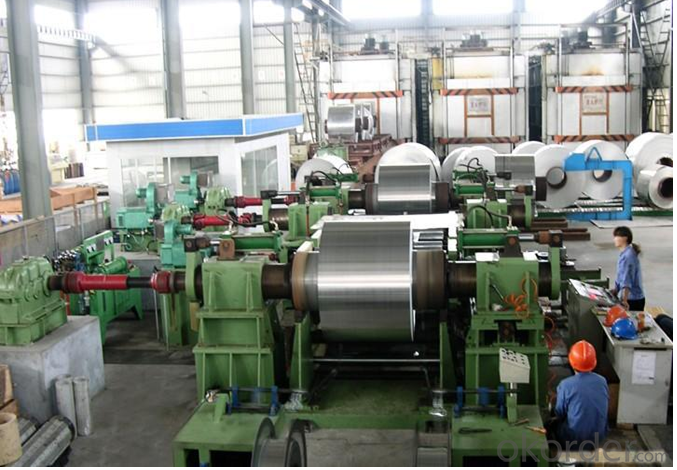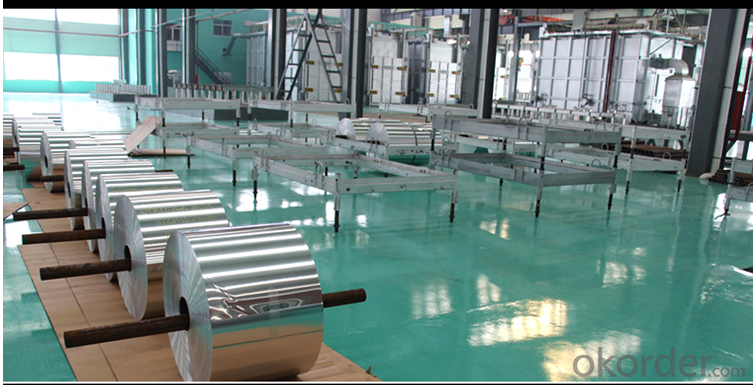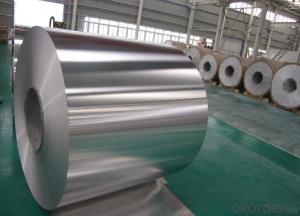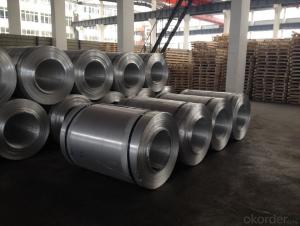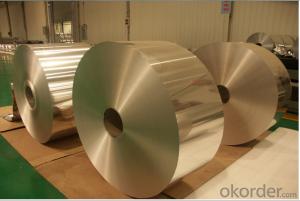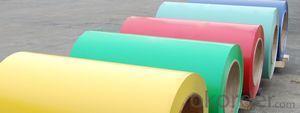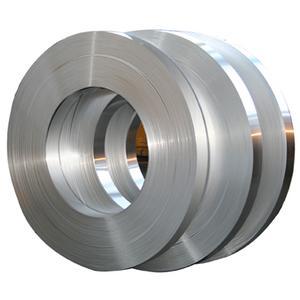High Quality Black Aluminum Coil Temper 1070
- Loading Port:
- China main port
- Payment Terms:
- TT OR LC
- Min Order Qty:
- 10 m.t.
- Supply Capability:
- 1000 m.t./month
OKorder Service Pledge
OKorder Financial Service
You Might Also Like
Specification
Description of Aluminium Coil
5000 series aluminium alloy sheet: 1070 aluminium alloy sheet are representative in the 5000 series of aluminium sheet. The 5000 series aluminium sheet is the more commonly used aluminum alloy sheet series, the main elements is magnesium, also it can be called Al-Mg alloy. The 5000 series aluminium alloy sheet main feature is low density, high tensile strength, high elongation, etc. In the same area under the weight of aluminum-magnesium alloy is lower than other series, so the 5000 series aluminium alloy sheet is often used in aviation, and it are also widely used in the conventional industry.
Alloy | Thickness(mm) | Width(mm) | Length(mm) | Temper | DC or CC | |
1050,1060,1070,1100, 1235 | 0.2-3.0 | 300-1850 | 1000-8000 | O,H12,H22,H14,H24,H16,H26,H18,H32 | DC, CC | |
3.0-150 | 900-1900 | H112,H111 | DC | |||
3003,3004,3105,3005 | 0.2-3.0 | 300-1850 | 1000-8000 | O,H12,H22,H14,H24,H16,H26,H18,H32 | DC, CC | |
3.0-150 | 900-1900 | H112,H111 | DC | |||
5052,5083,5754,5005 | 0.2-3.0 | 300-1850 | 1000-8000 | O,H12,H22,H14,H24,H16,H26,H18,H32,H36 | DC | |
3.0-150 | 900-1900 | H112, H111 | DC | |||
6061,6063 | 0.5-3.0 | 300-1500 | 1000-6000 | T6,T321 | DC, | |
The Main Features of Aluminium Coil:
High quality with competive prices.
Wide product range of choice.
We are specific manufacture and control.
The Images of Aluminium Coil:
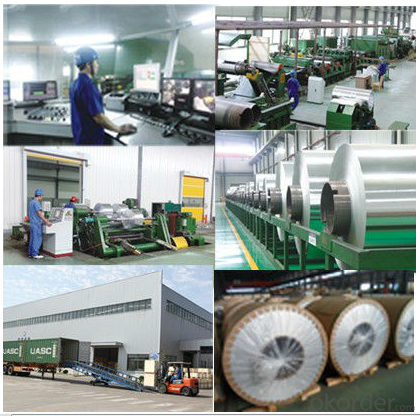
FAQ:
1. Minimum Order Quantity? MOQ is 25 tons, your quantity is ok, the aluminium foil sample is available. |
2. What kind of terms of payment? T/T, L/C,D/A,D/P,Western Union are available. |
3. What grams of the product can you offer? Our products can be customized according to your requirment |
4.Can you do Customization & Reproduction if I provide a photo? Yes, we do Customization & Reproduction service, please check the details and sample above. You need to send the pictures to our email, tell us the specification you want, then we will quote you exact price. We will take photos for you check. |
5. Does the packaging safe and arrive in good conditions? Yes, Safe Packing guarrantee, all the products will arrive your door under good conditions. We response to problem of shipping if there unfortunately is. |
6. How long does it usually take to deliver the product? We'll make the shipment to you immediately. It will take about 18 to 40 days arrive worldwide. Accurate delivery time depends on the specific quantity |
7.Is drop shipping abailable? Yes, it is, we can send to worldwide. |
- Q: Can aluminum coils be used in automotive suspension systems?
- Automotive suspension systems can utilize aluminum coils. Aluminum, a lightweight and sturdy material, provides numerous advantages for suspension components. Its high strength-to-weight ratio allows it to handle heavy loads without burdening the vehicle with unnecessary weight. This can enhance fuel efficiency and overall performance. Furthermore, aluminum is resistant to corrosion, making it particularly valuable for automotive suspension systems exposed to harsh weather conditions and road debris. By incorporating aluminum coils, manufacturers can ensure that suspension components have a longer lifespan and require less maintenance. In addition, aluminum coils possess superior heat absorption and dissipation capabilities compared to materials like steel. This aids in preventing overheating and mitigating the risk of suspension failure, especially during intense driving conditions or off-road usage. However, it is important to note that the use of aluminum coils in automotive suspension systems may entail certain compromises. Although aluminum is lighter and more resistant to corrosion, it may not be as strong as steel. Therefore, manufacturers must meticulously design and engineer the suspension system to ensure it can withstand necessary loads and provide sufficient support and stability for the vehicle. In summary, aluminum coils can be effectively employed in automotive suspension systems, offering benefits such as lightweight construction, corrosion resistance, and efficient heat dissipation. Nevertheless, manufacturers must carefully consider the specific requirements and trade-offs associated with aluminum usage in suspension components to ensure optimal performance and safety.
- Q: I don't have a rounded baking tray at the moment and would like to replace it with aluminium foil, do you think it's suitable and that it can withheld the intensity?
- Cheesecake batter is dense. An aluminium tray may not be stiff enough to retain the proposed shape of your cake. Test the pan; load it to the top with water. If it doesn't collapse your cheese cake will not either. You could try using two trays nestled together. You also may need to load the cake and tray on a flat tray when you move it around. Use a thermometer to know when the cake should be pulled. Cook's suggests the top limit at 150 degrees F. Do grease the sides of the pan. Be sure to loosen the cake from the pan side after it is out of the oven. I bake my cakes at 500 degrees F. for ten or twelve minutes, and then to the 150 degree F point at 200 degrees F. Do not open the oven or try to cool it down. Simply dial down the thermostat. If the cake looks too brown cover it with a piece of aluminium foil. Have fun! Avoid cracks...don't overcook the cake!
- Q: This question asks for a comparison of various types of insulation materials, highlighting their unique characteristics and differences.
- <p>Different types of insulation materials vary in their properties such as thermal resistance (R-value), fire resistance, moisture resistance, and environmental impact. Fiberglass is a common, cost-effective option with good thermal resistance but can be irritating to the skin and respiratory system. Cellulose insulation is made from recycled paper and has good sound absorption but may be less fire resistant. Foam insulation like spray foam offers excellent insulation and air sealing but can be more expensive and harder to install. Mineral wool is fire-resistant and durable but may be less thermally efficient. Each type has its advantages and drawbacks, and the choice depends on factors like cost, environmental impact, and specific insulation needs.</p>
- Q: What are the common surface protection methods for aluminum coils?
- Various industries widely use several common methods for protecting the surface of aluminum coils. These methods aim to ensure the long-term durability and performance of the coils by preventing corrosion and other types of damage. Anodizing is one of the most common surface protection methods for aluminum coils. It involves immersing the coil in an electrolyte bath and applying an electric current to create a protective oxide layer on the surface. This oxide layer not only improves the appearance of the coil but also enhances its resistance to corrosion, scratching, and wear. Coating is another popular method for protecting the surface of aluminum coils. It involves applying a layer of paint or coating material onto the coil's surface. Coatings can be applied using various techniques, such as electrostatic spraying, roll coating, or coil coating. These coatings act as a barrier between the aluminum surface and external elements, safeguarding it from moisture, UV radiation, and other environmental factors that can cause corrosion and damage. Protective films also offer a way to protect aluminum coils. These films, typically made from polyethylene or similar materials, are applied as a temporary protective layer. They help prevent scratches, abrasions, and other types of damage during transportation, storage, and installation. When it's time to use the aluminum coil, the protective film can be easily peeled off, leaving behind a clean and undamaged surface. Proper storage and handling practices are also crucial for protecting aluminum coils. Storing the coils in a dry, clean, and well-ventilated area, away from corrosive substances, can significantly extend their lifespan. Additionally, handling the coils with care and using appropriate lifting and transportation equipment can prevent physical damage that could compromise their integrity. In conclusion, the common methods for protecting the surface of aluminum coils include anodizing, coating, the use of protective films, as well as proper storage and handling practices. By employing these methods, aluminum coils can be effectively safeguarded against corrosion, scratching, and other forms of damage, ensuring optimal performance and longevity.
- Q: What are the typical mechanical properties of aluminum coils?
- The mechanical properties of aluminum coils may differ depending on the specific alloy and temper of the material. However, aluminum coils typically possess the following mechanical properties: 1. Tensile strength: Aluminum coils generally demonstrate a high tensile strength, which refers to the maximum amount of tensile stress a material can endure before breaking. This property is crucial for applications that require the material to withstand heavy loads or stress. 2. Yield strength: Yield strength represents the stress threshold that a material can bear without undergoing permanent deformation. Aluminum coils typically possess a relatively high yield strength, enabling them to maintain their shape and structural integrity under normal operating conditions. 3. Elongation: Elongation refers to the extent to which a material can stretch or deform before fracturing. Aluminum coils usually exhibit a relatively high elongation, making them suitable for applications that involve forming or bending without breaking. 4. Hardness: The hardness of aluminum coils may vary depending on the alloy and temper. Aluminum alloys can undergo heat treatment to enhance their hardness, rendering them more suitable for applications that demand wear resistance or the ability to withstand harsh environments. 5. Fatigue strength: Fatigue strength denotes a material's capacity to resist the formation and growth of cracks under cyclic loading conditions. Aluminum coils generally exhibit good fatigue strength, making them suitable for applications subjected to repeated or fluctuating loads. It is important to note that these properties can vary depending on the specific alloy, temper, and processing conditions of the aluminum coils. Therefore, it is advisable to refer to the material specifications or contact the manufacturer for more precise and detailed information regarding the mechanical properties of specific aluminum coils.
- Q: Can aluminum coils be anodized?
- Indeed, it is possible to anodize aluminum coils. Anodizing, an electrochemical technique, enhances the existing oxide layer on the aluminum's surface, rendering it denser, sturdier, and more resistant to corrosion. This particular process finds widespread usage in aluminum sheets, plates, and coils. Anodizing can be effectively employed on both flat and shaped aluminum coils, imparting them with a plethora of appealing hues and finishes. Furthermore, the anodized coating significantly improves the aluminum's capacity to accommodate paint and adhesives, thereby rendering it a highly sought-after option for numerous applications, including architectural cladding, automotive trim, and electronic components.
- Q: Are aluminum coils available in custom sizes?
- Yes, aluminum coils are available in custom sizes.
- Q: Are aluminum coils suitable for gutter systems?
- Indeed, gutter systems find aluminum coils to be quite suitable. Given its durability, lightweight composition, and exceptional resistance to rust and corrosion, aluminum stands as a favored selection for gutter systems. This cost-effective alternative can endure severe weather conditions while boasting an extensive lifespan. Furthermore, the installation and maintenance of aluminum coils prove to be effortless, rendering them an optimal choice for gutter systems.
- Q: wood aluminium windows?
- Vinyl looks MODERN and are in all the track homes. If you want you home to look cookie cutter choose the vinyl. If you have a nice home in an upscale neighborhood choose wood and any other other combo of wood and ?. If you are like the rest of us average shmos get the white vinyl
- Q: What are the applications of aluminum coils?
- Aluminum coils have a wide range of applications in various industries due to their unique properties and versatility. One of the major applications of aluminum coils is in the construction industry. These coils are used for roofing, siding, and insulation purposes as they are lightweight, durable, and resistant to corrosion. Aluminum coils are also commonly used for manufacturing gutters, downspouts, and ventilation systems in buildings. In the automotive industry, aluminum coils are used for manufacturing various parts such as heat shields, radiators, and condensers. The lightweight nature of aluminum makes it an ideal choice for improving fuel efficiency and reducing the overall weight of vehicles. Additionally, aluminum coils are used in the production of heat exchangers and air conditioning systems for automobiles. Aluminum coils are extensively used in the packaging industry as well. They are commonly used for manufacturing beverage cans, food containers, and packaging materials. Aluminum's high ductility and excellent formability make it a preferred choice for producing these types of products. Moreover, aluminum coils provide a barrier against moisture, light, and oxygen, ensuring the preservation and protection of the packaged contents. Another important application of aluminum coils is in the electrical and electronics industry. These coils are used in the production of transformers, power distribution systems, and electrical conductors. Aluminum's high electrical conductivity and low density make it advantageous for these applications. Furthermore, aluminum coils find applications in the manufacturing of appliances, such as refrigerators, air conditioners, and washing machines. They are also used in the production of furniture, decorative items, and various consumer goods. Overall, the applications of aluminum coils are vast and diverse, ranging from construction and automotive industries to packaging, electrical, and consumer goods. The unique combination of lightweight, durability, corrosion resistance, and excellent formability make aluminum coils an indispensable material in numerous sectors.
Send your message to us
High Quality Black Aluminum Coil Temper 1070
- Loading Port:
- China main port
- Payment Terms:
- TT OR LC
- Min Order Qty:
- 10 m.t.
- Supply Capability:
- 1000 m.t./month
OKorder Service Pledge
OKorder Financial Service
Similar products
Hot products
Hot Searches
Related keywords
